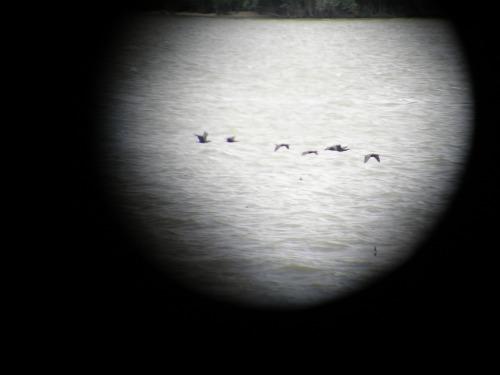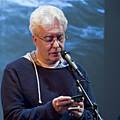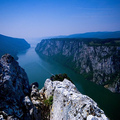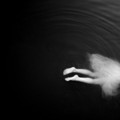A HLO jóvoltából a Duna-legendárium meghívásos pályázatán részt vevő szerzők közül tíz és mellettük öt külföldi író Duna-szövege olvasható angolul is. Az írások hamarosan a Litera és a Hungarofest közös kiadásában megjelenő Legendary Danube című angol nyelvű kötetben is olvashatóak lesznek. Elsőként Györffy Ákos írását ajánljuk.
On that dawn in May the water, smooth as a mirror, carried a scent of flowers. Rather as if an invisible vernal meadow were floating above the river. The slumbering cormorants were still huddling on the spars of the marker buoys with their flashing red and blue lamps. There was a mighty hush in the bend of the river. Best not dispense with the long johns yet, my friend muttered quietly—not that I am in any way prudish, but somehow I cannot envisage myself as being naked on the far side.

For a riverbank person there was never any question that the Danube is a living creature. Not even if it never once occurred to him to ponder on this. The Danube meanders in the deep strata of consciousness, and always did. A time when the Danube was not within me is unimaginable, says this man. I was already speaking the language of the Danube at a time when I could not yet speak a human tongue, and when I dreamed it was the Danube which projected images into my mind. Behind every thought I have lie surging waters, and when I shall be no more that will merely mean that the Danube is flooding my heart, washing away all which has no significance, because nothing which is not the Danube has any significance.
We had been drinking at the Atmosphere Café since ten o’clock that evening. Round about midnight, the barmaid wished to close down, but she didn’t have the heart to bring our conversation to an end and proposed instead that she would be away for a few hours, with the grille door to the bar being pulled down, but we were welcome to stay on. We knew where the beer was, and we could even up the money in the morning. It is fairly rare for barmaids in their fifties to make such handsome gestures, so we could only guess as to what to attribute this generosity to. She was sure herself, she said; she simply felt that it would not be right to send us on our way right now. That there was something inside us against which she was powerless, and when we first dropped into the tavern earlier this evening she knew that we were going to say until the morning. She smiled placidly at us as if she were our mother, and then she was already off, having gently shut the grilles behind her.
I don’t recall when I first told my friend that I reckoned the only choice left to us was to swim across the Danube. The conversation at the time was about a quite different subject when I suddenly felt an unstoppable urge to make that pronouncement. At first he continued his interrupted sentence as if he had not heard a word I had said. Even I myself don’t know what prompted me to say it, or indeed how it came to mind at all—it was as if I had not said it, and didn’t even recognise my own voice. Whose voice? I read later in a work by Carl Gustav Jung that in the most unexpected situations his mother would address him in an utterly peculiar voice, and when she switched to that voice it always signified something. She would say things at the dinner table which were quite unbefitting, and others would generally not even notice. Oddest of all, she herself did not notice, even though the sentences, Jung writes, always concerned very profound matters and touched very directly on those who lived around her.
Without due initiation, a person remains an intellectual infant, and whatever one does in later life one is unable to emerge from that infancy. I had always known that a time would come when I was going to have to swim across the Danube. Everybody knows it is something they have to do some time, despite which most people never do it; they die without having done so. The thought of swimming across accompanies us throughout life. It is possible not to think of it, but that does not alter the main point. We may no longer know what this signified, or why we need swim across it; there is just the knowledge that one must, and there is no other way.
He for one did not know from where I had come by this garbage that he in particular, and right now in particular, needed to, my friend said, after I had repeated for his benefit that there simply was no other choice; we had to get cracking, simple as that. At best only if I would reveal to him why—if there were a pressing reason. My response was on the lines that the fact we had not done it so far was a pressing enough reason, and we both knew that we would merely be juggling with words until we submitted to the will of the river. Because that is what it desired of us, just as we ourselves desired it, and that was how and what it had to be. Fair enough, he said after a long silence, after which we drank up our beers and left everything on the table—cigarettes, wallets, mobile phones.
I sobered up instantly from the cold water, and my eyesight became astonishingly sharp. Until I broke the surface following my header it was as if I had not lived. It took a few seconds for me to come to my senses. My suddenly sharpened eyesight worked both internally and externally alike. All of a sudden everything fell into place as if I just happened to be dropping into the birth canal of a huge womb. I left this world behind me; I was looking back on it both from outside and from above. So that’s the me about whom I never knew until then. Here the Danube is about 500 metres wide, but in order that we could swim across we would undoubtedly have to cover twice that. On reaching the mainstream I was snatched by a force that I had never experienced the likes of previously; it was truly as if the path ahead led one through death. I rolled on my back at times in order to check whether my friend was OK. Having been carried by the current somewhat further down the river, he was swimming with closed eyes in the leaden water. The Castle Hill on the far bank grew to an immense size, entirely filling the horizon, not allowing room for anything else within me. The mossy rocks engaged my consciousness. Looked at from where I was, the well-known scenery appeared totally novel and strange. Where was I? It was not here that I had lived heretofore; it was all the way the river saw it, not I. I had become the gaze of the Danube; I saw the sky and the blocks of forest disappearing from the half-light with the eyes of the Danube. The force which had snatched me was familiar from long ago only I had not remembered it as I had never encountered it since I came into the world. The force was endeavouring to make me forget every idea; I was to know nothing, not count on it. I heard a great hollering behind me. It seemed my friend was now confronting where he had arrived at. As if I were a planet in a solar system and was submitting to the dazzling attraction of a nearby star. The perception of the motionless presence behind a continually changing picture is indeed able to entice only a yell from one’s throat.
We managed to crawl on our bellies over the slippery stones of the river bank. We lay panting on the fine gravel. The idea of swimming back as well never crossed our minds; we would not have survived that for sure. We walked the few hundred metres to the ferry by the main road and its revivified traffic in nothing more than our underpants. There were some who wished to call the police, and one who shouted from his car what the shit did we hopheads think we were doing, stumbling along the roadside at crack of dawn, obviously smashed out of brains, in our underpants. We just managed to reach the very first ferry of the morning. We no doubt served up an experience of a lifetime to the awakening passengers of a tourist coach with German licence plates.
The Sun rose from behind the Castle Hill, while we, leaning on one of the ferry’s rails, shivered in the cool breeze. Our underpants bore mud stains, and my friend’s had also been ripped along the way: we genuinely did both look as if we had shit ourselves. On getting back to the tavern we found everything as we had left it. The barmaid had not yet returned, so we drank what beer was left and smoked a cigarette without saying a word. There was nothing we had to say to one another as we both know the whole story. We left some money on the counter, and pulled the grille after leaving. Unable even to think of sleeping, I made for the fish fryer’s by the river bank as at around that time the business’s dogsbody was in the habit of putting the chairs out on the concrete forecourt; perhaps coffee had already been brewed.
I spotted the water police from a long way off: they were loafing about at the foot of the ferry ramp. There were three of them, standing around some sort of dark grey mound in the sand. As I reached the spot I saw that it was a dead body—in underpants and with long brown hair covering his face. Any inclination I had had for a coffee evaporated, so I set off home for preference. Lying on the carpet there, I listened to the whole of a recording of Meredith Monk’s music, from which I was seized by such a strong restlessness that I went back to the riverbank. The first person whom I met was my old kayaking coach. He braked his bicycle to a halt beside me and asked me if I knew that Tamás had drowned. That was my friend he was talking about. Because he had seen us at daybreak when he had been fixing the engine of the motorboat in the yard of the kayak club. He saw us jump into the water from the club’s jetty. The water police had told him just before that they had found Tamás at the ferry. They had been called by a fisherman, who had been spinning for fish by the rapid-flowing stretch of river under where the ferry berthed. Tamás couldn’t be dead, I told the coach, as we came across the river together; there must be some mistake. They had already contacted his wife, the coach said, and he himself had had a feeling there was going to be trouble when he saw us dive into the water at dawn. It was not so much me as Tamás for whom he had been concerned. He was too old for such capers, besides which he was not used to it. No, that’s not him for sure, I said; the person in question just looks like him.
As he raced away on his bicycle I called my friend on my mobile. He didn’t pick the phone. I tried him again at least five times. Nothing. Then my own phone rang. His wife was calling. She was screaming as she asked me where Tamás was; just beforehand the police had called her, but she could not believe what they had told her. He said he was going to go home, I mumbled into the phone, and she shouldn’t worry because the body retrieved from the water was not Tamás. You dragged him into it, she shrieked tearfully; it was no doubt you who hit upon the idea of swimming across. Yes, it was me; I hit upon the idea. I couldn’t tell her that it was the Danube, that the Danube wanted it, which would have been no less than the truth either. At that point my phone battery ran down, leaving me with the sound of that shrieking voice in my ear.
Swallows hunting for bugs were circling above the sparkling water. They would touch the water for a mere moment, always just a moment that was barely detectable to the eye. The pungent fragrance of the old poplars spilled over the footpath. For a few seconds I could believe what I had heard; that it really was Tamás lying there this morning on the damp sand. He had been drinking somewhere and only got home that evening. As far as his wife was concerned he had been dead for around half a day. Initiation is like death—it mimics death. The first sunbathers arrived at the riverbank, with the mothers of small children setting up sunshades. By then the strong backwashes of luxury yachts had obliterated all traces of the corpse from the sand.
























